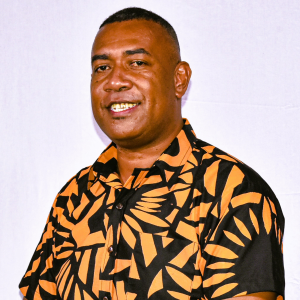


It is my pleasure to welcome everyone to the College of Agriculture, Fisheries and Forestry, Fiji National University. We pride ourselves as a very complex College, consisting of four professional, scientific areas – agriculture, fisheries, veterinary science and forestry. Although this presents a challenge, we focus more on the benefits of having these four areas in one College, as it gives us the advantage to work across the disciplines, to develop far-reaching solutions to each of the professions. We are increasingly operating in a world where such multi- and inter-disciplinarity is the norm rather than the exception. With our complexity, we can link learning and teaching as well as research, to improve scientific understanding and increase economic gain. Thus, we are able to re-forest and produce fruits or re-forest, create mixed agricultural systems and produce medicinal plants at the same time. The options that we can create are limitless. While we cherish the ability to create these combinations, we leave open the option to intensify activities in any one discipline to improve outcomes for Fiji and the other South Pacific Island nations. We fully recognise the enormous potential that the country and the South Pacific region possess in each of our four discipline industries. We are set to real outcomes from this potential.
We pride ourselves as the first and only Veterinary Science group in the South Pacific. As the University celebrates its tenth anniversary, we will be positioning ourselves as regional as well as national champions not only in Veterinary Science but in Agriculture, Fisheries and Forestry. We are launching our postgraduate programmes from 2020, and we are creating new undergraduate programmes to address the skills shortages of Fiji and the South Pacific islands. We are guided by our history, from the days of the Fiji College of Agriculture (FCA) to the present. The FCA met the agricultural workforce needs of Fiji, creating graduates with qualifications at the Certificate and Diploma levels. We are committed to keeping this legacy but we are not oblivious of the fact that human resources quality needs to be improved, rising to the Bachelor degree level and on to postgraduate studies, which will enable intense investigations into problems that hamper the economic development of the country and region.
Our vision at the College is to develop workforce for the service ministries in charge of agriculture, forestry, fisheries and across the national economy. We also intend to improve the quality of the existing workforce in these ministries through further training at the undergraduate and postgraduate levels. We are reaching out to collaborators from across the Pacific and beyond, and positioning the College as the preferred site for research into Fijian and South Pacific problems in our discipline areas. We will work with funding agencies, which have the mandate to develop human resources in the region and also conduct research, to develop outcomes that can be applied in the region as well as in other areas with similar conditions. We have signed memoranda of understanding with institutions across the world, to improve our teaching and research delivery. While creating workforce for the Fijian and regional governments, we are also mindful of the importance of growth in the private sector, which would create more employment to complement, if not surpass government ministries. It is our desire to meet the workforce needs of existing industries, enable the emergence of newer industries and empower our own graduates to create jobs for the country.
We have identified poor dissemination of research findings as an impediment to the adoption of such findings in the country and region and have developed strategies to address this shortcoming. We re-introduced the Department of Agribusiness and Extension and have created a journal to publish our findings, and to support researchers working in similar regions. The aim of the journal is to build a critical mass of knowledge that can be adopted by the industry and government sectors, to enhance productivity.
We are re-developing our research farm facilities to deliver postgraduate training but also to improve undergraduate teaching effectively. As we enter the second decade of the University, we see a bright future, not only for the College but for the country and the region. We will not rest on our oars until the full potential of Fijian land and water resources is realised. We count on our numerous alumni and other stakeholders to visit us and support us with infrastructural development, research funding and offer of student awards. We call on everyone to be part of our vision.
Dr Kaliova Tavou Ravuiwasa
Dean
College of Agriculture, Fisheries and Forestry (CAFF)
Fiji National University